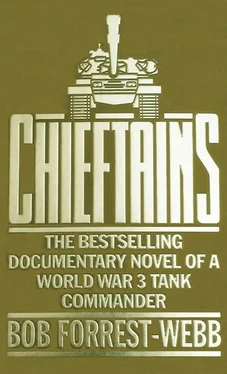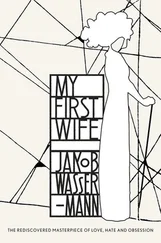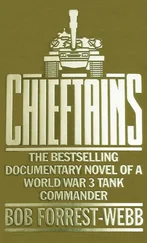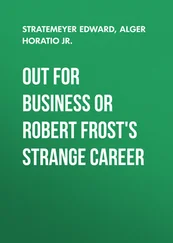He was on his knees, his throat full of blood, his torn lips and gums feeling as though they were burning. He put his hand to his mouth; his teeth were broken stumps and there were sharp splinters in the wounds. His nose was bleeding.
‘As I warned you, there is no time for finesse. Now. Do you wish to help us? If you do so, there will be immediate medical assistance for you. You have simply to identify the code words.’
Studley coughed the blood from his throat. The GRU officer’s voice sounded distant, and the floor beneath him felt like the swaying deck of a small boat. He attempted to concentrate his mind on a single thought… Jane. He tried to block the pain with memories.
The guard stamped down on to the wound in Studley’s leg.
There were a group of military police on the road ahead of Sergeant Davis, their tempers frayed as they attempted to funnel the civilian refugees to one side to allow the passage of convoys of military vehicles towards the battle area. The number of refugees astonished Davis. He had expected some, but it seemed all the people from the town of Schöningen and villages near the border were trying to get away from the advancing Russian armies. There were queues of every kind of civilian vehicles, barely moving at walking pace along the entire length of the road. He had seen newsreel pictures of the Second World War when refugees had similarly blocked the movement of troops, but hadn’t expected it to be like that now. Cars and lorries had broken down, run out of fuel, and been abandoned at the roadside still piled high with family possessions. Trucks and farm wagons, tractors and their sugar-beet trailers, people on foot or on bicycles, moved in a slow but determined procession towards the west. Davis followed the route of the road, but kept to the fields except where boundary ditches or irrigation dikes forced him back. Angrily, the refugees paused to let him by, and he knew from their contemptuous stares they suspected the two tanks, like themselves, were fleeing from the enemy.
The flood crept past the military police, obeying their desperate signals for only meters before swelling back to occupy the full width of the road. A convoy of Stalwarts was making only a few kilometers an hour eastwards, despite their drivers’ attempts to make use of the verges at the roadside.
A harrassed young corporal, red-eyed with fatigue, clambered on to Davis’s Chieftain. ‘Who the ‘ell are you?’
Davis told him.
The corporal checked a list. ‘Okay, Sergeant. Your re-grouping area is three kilometers on… you’ll see crossroads after Kissleberfeld and then your divisional number on a black sign — that is if some bastard hasn’t moved it. Turn right there; it’s unsurfaced. And keep off this road as much as possible.’ He stared at the scarred hull of the tank, seeking an excuse for further conversation to keep him a few moments longer from his near-impossible task. ‘Was it bad, mate?’ Davis nodded. It was too early yet to find adequate words to describe the previous few hours of battle. ‘Bastards,’ the corporal swore. ‘I’d hang every fuckin’ Russian we catch. Watch out for their bloody Floggers; they’ve been brassin’ the roads every hour or so… civvies, everything. Murdering swine. A bit north of here the convoys are driving through swamps of pulped bodies, it’s the only fuckin’ way they can get the supplies up.’ He pointed towards drifting smoke three hundred meters across the fields. ‘See them… AFVs they caught in the open. And this soddin’ lot…’ He jerked his head towards the slow-moving river of people. ‘Get ’em out of the way, and a minute later they’re all over the road again… they’re fuckin’ deaf… daft. It’s all fuckin’ murder. We heard it’s even worse towards Hannover.’ His conscience nagged him as he heard shouting from his colleagues. ‘Take care, mate. And when you’re in there again, give ’em one up the arse for the Redcaps. So long.’
It took Davis half an hour to travel the last three kilometers. He managed to shorten the distance a little by taking a more direct route across country. Where possible he used the cover close to the fringes of woods, and well away from the roadway. He kept his eyes open for aircraft, but it wasn’t easy; there were plenty in the skies but he couldn’t always identify them. A few screamed over at little more than tree-top height heading eastwards; they were NATO planes, but even had they been Russian he couldn’t have reacted quickly enough to take evasive action. It wasn’t the low-flying aircraft he feared, for they came and went in seconds with their pilots concentrating on targets many kilometers ahead of them; the greatest danger was from those who stooged at a high altitude, risking the anti-aircraft missiles or attacks from NATO planes, as they searched for vehicle concentrations.
There were more military police near the regrouping area, a roadblock overlooked by a machine gun post. Again Davis was stopped, and this time his identification was carefully scrutinized by an officer before he was allowed to continue. Enemy sleeper groups had been reported to be making use of captured NATO vehicles to infiltrate depots; an incident a few minutes earlier, at one of the airfields, had brought renewed warnings. The police and guards were nervous of any vehicle which showed signs of combat. The MP officer pointed with his swagger-cane. ‘Over there to the right, Sergeant. Follow your number. When you get to the harbour area, get your vehicle out of sight fast. Cam’ it, and report to the command vehicle at once… PDQ… on your way.’
The roll of camouflage netting which had been lashed to the Chieftain’s hull was missing, as was all of the external equipment, jerry cans, tools, cable reel. The left-hand smoke grenade launchers had been torn from the turret, and the infra-red searchlight was smashed and buckled out of shape. Once the tank had been parked, the crew climbed out of the hull for the first time that day.
Shadwell was hugging his arm, his roughly bandaged hand under his armpit. His dark NBC suit concealed most of the bloodstains, but there were brown streaks down his face and neck. ‘Five minutes, lad, and we’ll get you to the aid-post. Can you hang on?’
Shadwell grimaced, then smiled. ‘It don’t hurt now, Sarge. Not as bad as toothache. I’ve got blisters on my arse though, from that seat’
‘’ere, have you seen this?’ Inkester was running his fingertips along a deep scar in the metal of the turret. ‘And Christ… look at these!’
‘Okay lads, that’s enough sightseeing. Inkester, there’s spare camouflage netting over there… double across and get it. DeeJay, give him a hand. If you need more, scrounge around while I go and report.’ Davis noticed Corporal Sealey lounging on the turret of the neighbouring Chieftain. ‘Don’t sit around, Corporal. Get your crew out and cam up. I want these two vehicles so well hidden I won’t be able to find them when I get back, understand? Jump to it, all of you.’ Shadwell moved with Hewett and Inkester. ‘Not you lad. You take it easy. If you can’t sit down, then see if you can find out where we can get some decent grub.’
Sergeant Davis recognized Captain Clarkson the operations officer in the Sultan. The officer’s clothing was still barracks-clean, and Davis was suddenly conscious of his own filthy appearance, but Clarkson made no comment.
‘We’ve been expecting you, Sergeant Davis. We’ve made contact with Captain Willis; he’s due here shortly, too. I’m afraid we’ve had a lot of casualties, Sergeant. Very unfortunate.’
Davis was unable to resist the question. ‘How many tanks have we got left, sir?
Captain Clarkson hesitated. Strictly speaking he shouldn’t divulge figures, but he knew Davis had as many years with the regiment as himself. ‘Discounting the headquarters squadron, fourteen.’
Читать дальше












